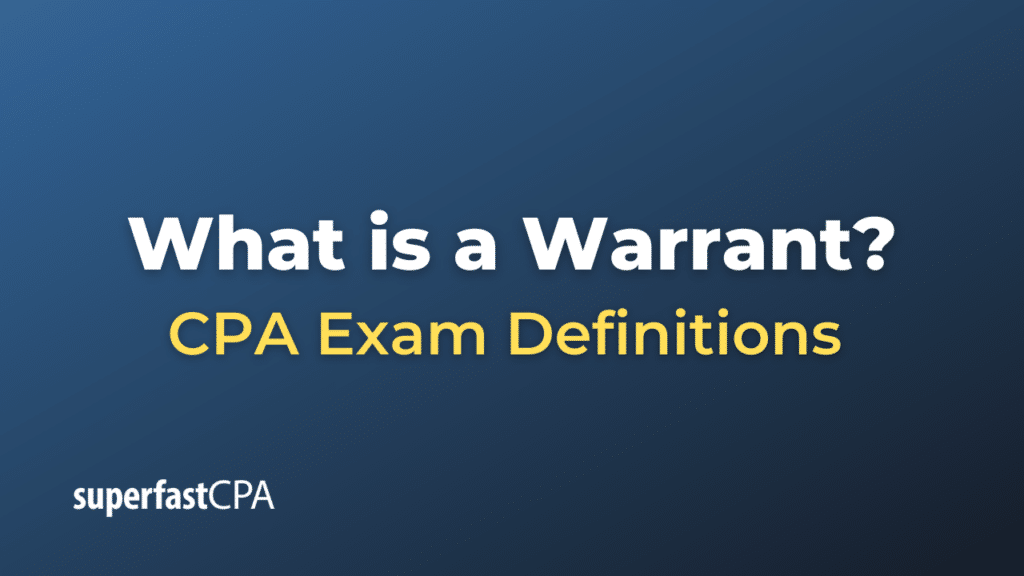Warrant
The term “warrant” can have multiple meanings depending on the context in which it is used:
Legal Warrant:
In a legal context, a warrant is an official document issued by a judge or magistrate that authorizes law enforcement officers to take certain actions, such as searching a property, seizing specific items, or arresting individuals. There are various types of legal warrants, including arrest warrants, search warrants, and bench warrants, each serving different purposes.
- Arrest Warrant: Authorizes law enforcement to arrest a named individual.
- Search Warrant: Authorizes law enforcement to search a specific place for specific items.
- Bench Warrant: Issued by a judge, typically for failure to appear in court.
Financial Warrant:
In the financial world, a warrant refers to a derivative that gives the holder the right, but not the obligation, to buy or sell a specific amount of a financial instrument (usually shares of a company) at a predetermined price within a set time frame.
Financial warrants are often issued by companies in conjunction with a bond or preferred stock offering. They can also be “standalone,” meaning they are issued on their own without any accompanying bonds or shares. Investors who hold warrants can exercise their rights within a certain period, often leading to the issuance of new shares by the company upon exercise.
Warehouse Warrant:
In the context of warehousing, a warrant is a document issued by warehouse operators similar to a Warehouse Receipt. A warehouse warrant confirms the existence and availability of a specific commodity stored in the warehouse and can be used to transfer ownership of that commodity.
Summary:
Whether in legal, financial, or warehousing contexts, warrants serve as authorized or legal instruments allowing for specific actions or rights. They serve as a form of guarantee and usually have specific conditions and timelines attached. Always consult with appropriate experts or professionals to understand the implications of a warrant in any particular situation.
Example of a Warrant
Below are example scenarios illustrating the concept of a “warrant” in legal, financial, and warehousing contexts.
Legal Warrant Example:
Scenario: Alice is suspected of possessing illegal narcotics. The police gather enough evidence to present to a judge.
Warrant Issued: After reviewing the evidence, the judge issues a search warrant authorizing law enforcement officers to search Alice’s residence for illegal narcotics.
Action: The police execute the search warrant and find illegal narcotics in Alice’s home. She is then arrested based on an arrest warrant subsequently issued.
Financial Warrant Example:
Scenario: Company XYZ is issuing bonds to raise capital. To make the bonds more attractive, they attach warrants to the bonds that give bondholders the option to purchase Company XYZ’s stock at a specific price.
Warrant Issued: Each bond comes with a warrant that allows the bondholder to purchase 10 shares of Company XYZ at $20 per share within the next five years.
Action: Two years later, Company XYZ’s stock price has risen to $30 per share. The bondholder exercises the warrant, buying 10 shares at the $20 price specified in the warrant, gaining an instant profit given the current higher market price.
Warehouse Warrant Example:
Scenario: Bob owns a large quantity of wheat that he cannot store on his farm.
Warrant Issued: Bob deposits the wheat in a local warehouse. In return, he receives a warehouse warrant detailing the quantity and quality of the wheat stored, as well as other terms and conditions of the storage.
Action: Bob uses the warehouse warrant as collateral to secure a loan from a bank. Later, he can either sell the warehouse warrant (and thus transfer the ownership of the wheat to someone else) or redeem the wheat by returning the warrant to the warehouse operator and paying any associated fees.
Each example demonstrates how warrants serve as formal authorizations for specific actions or rights in different contexts.













